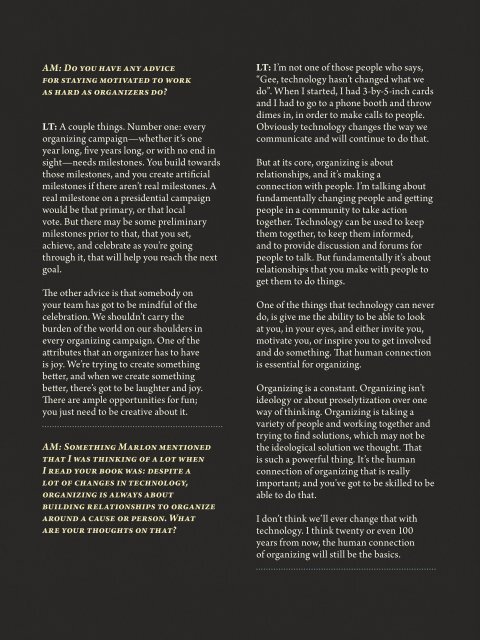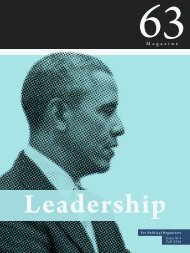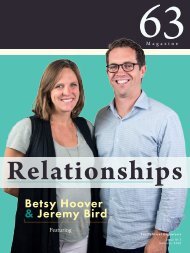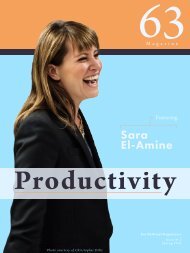63 Magazine - Issue 1
63 Magazine, for progressive political organizers. Issue 1 is all about Inspiration, featuring Marlon Marshall.
63 Magazine, for progressive political organizers. Issue 1 is all about Inspiration, featuring Marlon Marshall.
You also want an ePaper? Increase the reach of your titles
YUMPU automatically turns print PDFs into web optimized ePapers that Google loves.
AM: Do you have any advice<br />
for staying motivated to work<br />
as hard as organizers do?<br />
LT: A couple things. Number one: every<br />
organizing campaign—whether it’s one<br />
year long, five years long, or with no end in<br />
sight—needs milestones. You build towards<br />
those milestones, and you create artificial<br />
milestones if there aren’t real milestones. A<br />
real milestone on a presidential campaign<br />
would be that primary, or that local<br />
vote. But there may be some preliminary<br />
milestones prior to that, that you set,<br />
achieve, and celebrate as you’re going<br />
through it, that will help you reach the next<br />
goal.<br />
The other advice is that somebody on<br />
your team has got to be mindful of the<br />
celebration. We shouldn’t carry the<br />
burden of the world on our shoulders in<br />
every organizing campaign. One of the<br />
attributes that an organizer has to have<br />
is joy. We’re trying to create something<br />
better, and when we create something<br />
better, there’s got to be laughter and joy.<br />
There are ample opportunities for fun;<br />
you just need to be creative about it.<br />
AM: Something Marlon mentioned<br />
that I was thinking of a lot when<br />
I read your book was: despite a<br />
lot of changes in technology,<br />
organizing is always about<br />
building relationships to organize<br />
around a cause or person. What<br />
are your thoughts on that?<br />
LT: I’m not one of those people who says,<br />
“Gee, technology hasn’t changed what we<br />
do”. When I started, I had 3-by-5-inch cards<br />
and I had to go to a phone booth and throw<br />
dimes in, in order to make calls to people.<br />
Obviously technology changes the way we<br />
communicate and will continue to do that.<br />
But at its core, organizing is about<br />
relationships, and it’s making a<br />
connection with people. I’m talking about<br />
fundamentally changing people and getting<br />
people in a community to take action<br />
together. Technology can be used to keep<br />
them together, to keep them informed,<br />
and to provide discussion and forums for<br />
people to talk. But fundamentally it’s about<br />
relationships that you make with people to<br />
get them to do things.<br />
One of the things that technology can never<br />
do, is give me the ability to be able to look<br />
at you, in your eyes, and either invite you,<br />
motivate you, or inspire you to get involved<br />
and do something. That human connection<br />
is essential for organizing.<br />
Organizing is a constant. Organizing isn’t<br />
ideology or about proselytization over one<br />
way of thinking. Organizing is taking a<br />
variety of people and working together and<br />
trying to find solutions, which may not be<br />
the ideological solution we thought. That<br />
is such a powerful thing. It’s the human<br />
connection of organizing that is really<br />
important; and you’ve got to be skilled to be<br />
able to do that.<br />
I don’t think we’ll ever change that with<br />
technology. I think twenty or even 100<br />
years from now, the human connection<br />
of organizing will still be the basics.





